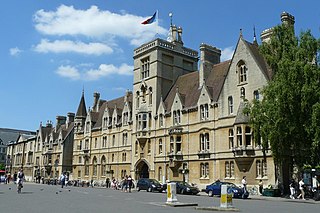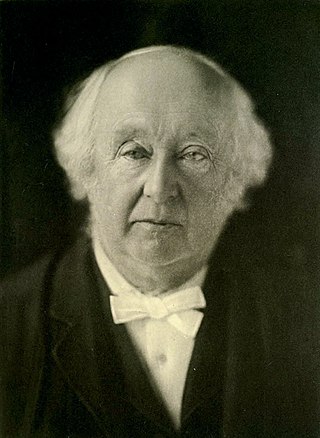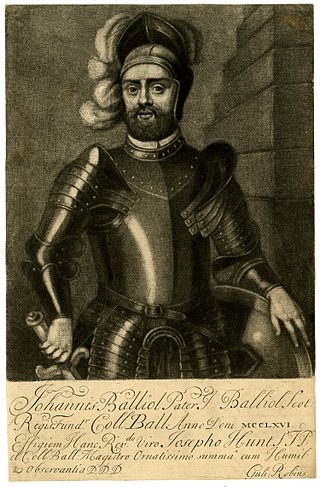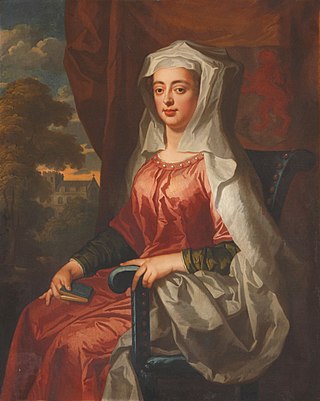Notes
| Academic offices | ||
|---|---|---|
| Preceded by | Master of Balliol College, Oxford 1563–1570 | Succeeded by |
| | This article relating to the University of Oxford is a stub. You can help Wikipedia by expanding it. |
Robert Hooper (1563-1639) was an English academic during the 16th-century. [1]
Hooper graduated B.A. from Balliol College, Oxford in 1558 and M.A. in 156o.. He was a Fellow of Magdalen from 1588 to 1603. [2] A priest, he held the living at Fugglestone St Peter. He was Master of Balliol from 1563 to 1570. [3]

John Balliol or John de Balliol, known derisively as Toom Tabard, was King of Scots from 1292 to 1296. Little is known of his early life. After the death of Margaret, Maid of Norway, Scotland entered an interregnum during which several competitors for the Crown of Scotland put forward claims. Balliol was chosen from among them as the new King of Scotland by a group of selected noblemen headed by King Edward I of England.

Balliol College is a constituent college of the University of Oxford. Founded in 1263 by John I de Balliol, it has a claim to be the oldest college in Oxford and the English-speaking world.

Trinity College is one of the constituent colleges of the University of Oxford in England. The college was founded in 1555 by Sir Thomas Pope, on land previously occupied by Durham College, home to Benedictine monks from Durham Cathedral.

Benjamin Jowett was an English writer, tutor, administrative reformer in the University of Oxford, theologian, Anglican cleric, and translator of Plato and Thucydides. He was Master of Balliol College, Oxford.

John de Balliol was an English nobleman, belonging to the House of Balliol. Balliol College, in Oxford, is named after him.
Andrew Graham is a British political economist. He is currently Executive Chair of the Europaeum and Chair of the Academic Council of the Europaeum, Senior Fellow of the Oxford Internet Institute, Trustee of Reprieve, and an Honorary Fellow of Balliol College, Oxford and of St Edmund Hall, Oxford.

Dervorguilla of Galloway was a "lady of substance" in 13th century Scotland, the wife from 1223 of John de Balliol and mother of John I, a future king of Scotland.

Cuthbert Scott was a Catholic academic at the University of Cambridge and Bishop of Chester.
James Brooks was an English Catholic clergyman and Bishop of Gloucester.
Alexander Dunlop Lindsay, 1st Baron Lindsay of Birker,, known as Sandie Lindsay, was a Scottish academic and peer.

Thomas Belson was an English Roman Catholic layman and martyr, beatified in 1987.

Balliol College Boat Club (BCBC) is the rowing club for members of Balliol College, Oxford, England. It is one of the college boat clubs at the University of Oxford.

John Parsons was an English churchman and academic, Master of Balliol College, Oxford, from 1798, and Bishop of Peterborough from 1813.
Francis Babington D.D. was an English divine and an academic administrator at the University of Oxford. He was elected Master (head) of Balliol College, Oxford on 2 September 1559, a post he held until he resigned the following year on 27 October 1560. Babington was Vice-Chancellor of Oxford University from 1560 to 1562. He was also Rector of Lincoln College, Oxford, from 1560 until he resigned in 1563.

Richard Jenkyns was a British academic administrator at the University of Oxford and Dean at Wells Cathedral.

Buittle Castle, also known historically as Botle or Botel Castle, is a Motte and Bailey site in Galloway, south-west Scotland with significant early and medieval history comprising a significant ruined Norman style Motte, and several extant buildings and gardens, including the later residential building in the form of the Tower House, on the historic Bailey. It is located in the valley of the River Urr, 1 kilometre (0.62 mi) west of Dalbeattie. The castle is within the parish of Buittle, in the traditional county of Kirkcudbrightshire and is a scheduled ancient monument.
Robert Thwaits was an English medieval academic administrator.
John Parkhurst (1563-1639) was an English academic during the late 16th and early 17th centuries.
Antony Garnet was an English academic during the 16th-century: he graduated B.A. from Balliol College, Oxford in 1547 and M.A. in 1551; and was Master of Balliol from 1560 to 1563.